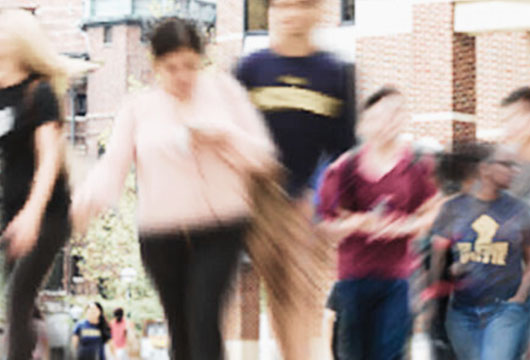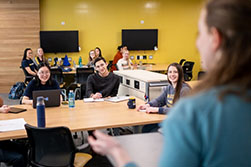| Transparent Teaching: A Focus of This Year’s Inclusive Teaching @ Michigan Series Mon, 04/01/2019 What does ‘transparency’ mean in a teaching-learning context, and why is it a key principle featured in many CRLT workshops and resources about inclusive teaching? Read more |
| Making Student Ratings More Useful: Guidelines for Students and Instructors Mon, 03/25/2019 As we approach the end of the term, students will be asked to provide feedback to instructors using U-M's course evaluation system. At CRLT, we often hear from faculty and GSIs who are discouraged about a number of issues related to student ratings, including the tone of some written comments, relatively low response rates, and uncertainty about how best to use the results productively. This post provides some resources for each of these concerns. 1) Minimizing Unhelpful Comments: Student ratings comments can be unhelpful when vague or irrelevant, whether positive ("Great course!") or negative (e.g., criticism of instructor attributes not linked to the learning environment). To encourage students to avoid rude or personally hurtful comments, CRLT worked with ADVANCE at U-M on a handout that instructors can give to students before they fill out their evaluations. The handout, Course Evaluations: Providing Helpful Feedback to Your Instructors, asks students to keep three key issues in mind when completing their ratings: Read more |
| Teaching in the Wake of Hate Incidents Fri, 03/15/2019 We wish we did not have so many occasions to provide guidance to instructors on teaching in the wake of hate-based violence. As our campus processes the news coming out of New Zealand today, we offer this slight update of a blog from October. In the wake of the massacre of worshippers at New Zealand mosques, many people in our community Read more |
| Now accepting applications for the 2019 May Preparing Future Faculty Seminar Fri, 02/01/2019  Nikolas Sweet Ph.D Candidate 2019 PFF Program Assistant Nikolas Sweet Ph.D Candidate 2019 PFF Program AssistantAre you considering a faculty career after graduation? Want to know more about how to prepare? The Center for Research on Learning and Teaching offers a month-long seminar, “Preparing Future Faculty” (PFF), which helps graduate students navigate the transitional period between graduate school and becoming a faculty member. Read more |
| New CRLT Resource: Supporting Students Facing Mental Health Challenges Wed, 11/14/2018
CRLT’s latest Occasional Paper “Supporting Students Facing Mental Health Challenges” provides a starting point for faculty and GSIs interested in exploring this topic. As the paper emphasizes, you can take many steps in your role as an instructor to normalize a focus on students’ mental health and set up an academic experience that promotes growth and resilience. In the Occasional Paper, you will find: Read more |
| Teaching with Student Veterans in Mind Thu, 11/08/2018
*updated November 7, 2018 During U-M's Veterans Week, it's a good time to reflect on the needs of our students who have served in the military. Did you know that record numbers of veterans are enrolling in U.S. colleges and universities--and many of them are here on U-M's campuses? Since January 2014, the university's tuition policy has allowed students who have served in the military to qualify for in-state tuition. If you teach at U-M, odds are good you've had or will have student veterans in your classroom. How might your awareness of veterans in the classroom make a difference in your teaching? The research on student veterans suggests several strategies and cautions for teaching inclusively with veterans in mind. Here are a few: Read more |
| Teaching in Teams: A Planning Guide for Successful Collaborations Wed, 08/22/2018 Have you been approached about team teaching, but are nervous about the process of sharing a classroom with other instructors? Have you participated in a team-taught course, and want to learn new strategies to make it even more successful in its next iteration? Are you looking to learn more about the benefits of team teaching for both students and instructors? Are you curious about team teaching, but unsure of how to plan for, structure, or evaluate such a class?
We welcome faculty and GSIs across campus to explore our newest Occasional Paper, Teaching in Teams: A Planning Guide for Successful Collaborations. Many team-taught courses seek to promote students’ development of higher-order thinking skills by enabling them to interact with instructors who have different sets of expertise and perspectives (Bacharach, Heck, & Dahlberg, 2008; Bierwert, 2011; Helms, Alvis, & Willis, 2005). And for instructors, team teaching enables instructors to encounter new content knowledge, as well as new perspectives on their own expertise (Bacharach et al., 2008; Plank, 2011; Shibley, 2006). As Dr. Laura Olsen (MCDB) shares: Read more |
| CRLT Resources on Active Learning Mon, 05/21/2018
The website includes:
Read more |
| Inclusive Teaching @ Michigan series 2018: Engaging Undergraduates as Teaching-Learning Partners Mon, 04/02/2018 In recent years, several colleges and universities have begun to include students more actively in faculty professional development opportunities, often engaging students to consult with faculty about both course planning and implementation. In a recent book on Engaging Students as Partners in Learning and Teaching, Alison Cook-Sather, Catherine Bovill, and Peter Felten delineate a range of positive outcomes of such student-faculty partnerships to improve teaching and learning. As these authors argue, “Students have insights into teaching and learning that can make [instructors’] practice more engaging, effective, and rigorous” (2014).
This year, as part of our 2018 Inclusive Teaching @ Michigan series (April 30 - May 4), CRLT will pilot two programs that include undergraduate student consultants as key partners for faculty who wish to think about course design in collaboration with students. These include: Read more |
| My "Preparing Future Faculty" Experience Wed, 02/14/2018 The Rackham School of Graduate Studies and the Center for Research on Learning and Teaching (CRLT) are excited to invite applications for the "Preparing Future Faculty" (PFF) seminar. PFF is a nationally-recognized program designed to help prepare doctoral candidates across disciplines for the academic job search and success in their subsequent faculty positions. Read below for reflections from past PFF participant and current PFF program assistant, public policy and sociology doctoral candidate Kennedy A. Turner. For more information about the program and application process, click here: http://crlt.umich.edu/programs/pffseminar. Applications are due March 1.
I know that many of my peers have similar origin stories, of an engaging professor who inspired them to pursue academia in the first place. Yet, the goal of becoming an engaging professor ourselves can easily get lost under the weight of courses, research obligations, and that whole “writing a dissertation” thing. Like research, writing, and other aspects of the job, teaching is a skill that can be learned and cultivated if taken seriously. Read more |


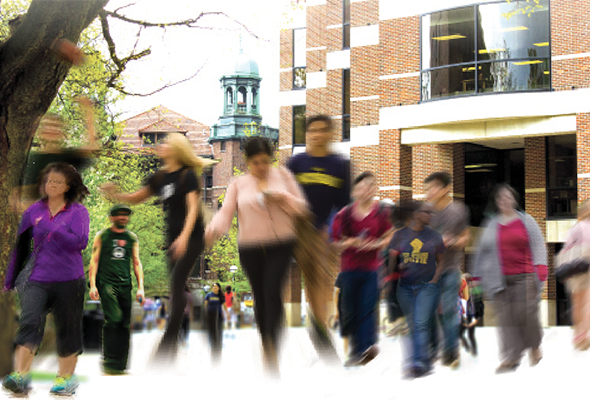 At its simplest, transparency means clearly communicating with students about course expectations and norms. As outlined below, such transparency can lead to more equitable learning experiences. That’s why transparency is the focus for this year’s Inclusive Teaching @ Michigan May workshop series. (Registration
At its simplest, transparency means clearly communicating with students about course expectations and norms. As outlined below, such transparency can lead to more equitable learning experiences. That’s why transparency is the focus for this year’s Inclusive Teaching @ Michigan May workshop series. (Registration 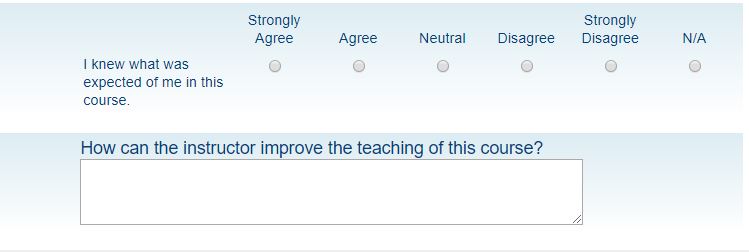
 are feeling threatened and terrorized, grieving deeply, experiencing intense anger, or fighting a sense of despair at a swelling of hatred and violence in our world. These emotions enter our classrooms, studios, and labs, and they can understandably and significantly affect students’ ability to focus on their learning and work with peers in intellectual community.
are feeling threatened and terrorized, grieving deeply, experiencing intense anger, or fighting a sense of despair at a swelling of hatred and violence in our world. These emotions enter our classrooms, studios, and labs, and they can understandably and significantly affect students’ ability to focus on their learning and work with peers in intellectual community. U-M counseling offices in collaboration with President Schlissel recently launched a
U-M counseling offices in collaboration with President Schlissel recently launched a 

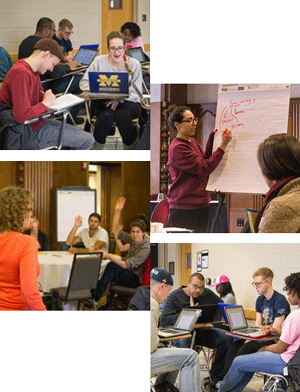 Faculty and GSIs from across campus are invited to explore
Faculty and GSIs from across campus are invited to explore  We’d add that student insights can likewise contribute to teaching practices that are more inclusive and equitable. Drawing upon their experience learning from a range of instructors and alongside a range of peers, student consultants can offer perspectives on several key
We’d add that student insights can likewise contribute to teaching practices that are more inclusive and equitable. Drawing upon their experience learning from a range of instructors and alongside a range of peers, student consultants can offer perspectives on several key  The moment I began to seriously consider pursuing a Ph.D. occurred when I was an undergraduate, sitting in a lecture for Introduction to Sociology. My mind was blown as my professor described the social structures that had previously been invisible to me. Through a single lecture, he was able to seamlessly challenge my existing assumptions about our social world. As I listened to his words, I was enthralled by the power and possibility of the university classroom. After also learning about the research side of faculty life, I decided that pursuing a Ph.D. in Public Policy and Sociology was the right path for me.
The moment I began to seriously consider pursuing a Ph.D. occurred when I was an undergraduate, sitting in a lecture for Introduction to Sociology. My mind was blown as my professor described the social structures that had previously been invisible to me. Through a single lecture, he was able to seamlessly challenge my existing assumptions about our social world. As I listened to his words, I was enthralled by the power and possibility of the university classroom. After also learning about the research side of faculty life, I decided that pursuing a Ph.D. in Public Policy and Sociology was the right path for me.